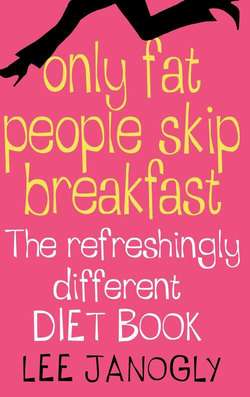Читать книгу Only Fat People Skip Breakfast: The Refreshingly Different Diet Book - Lee Janogly - Страница 28
High-protein, Low-carb Regimes
ОглавлениеIn the same week it was announced that the Atkins diet book—which advocates foods high in protein and fat and low in carbohydrates—was rivalling Harry Potter in sales, a report was published in the Lancet medical journal linking too much fatty food with an increased risk of breast cancer.
Dr Sheila Bingham, who led the study for the European Prospective Investigation of Cancer and Nutrition said: ‘The effect seems to be related particularly to saturated fat found mostly in butter, meat, lamb, sausages, bacon and cheese,’ foods which are the main staples of the Atkins diet. Women eating the most fat had a 33 per cent extra risk of developing the disease.
So—are you dying to be slim?
Another report by Dr Bill Robertson, a clinical biochemist at the Institute of Urology at the University College Medical School, claims that although you could lose a stone on the Atkins diet, you could also gain a stone—in your kidney. Kidney stones are extremely painful hard deposits that often need an operation or laser treatment to remove them. Dr Robertson says, ‘It (The Atkins Diet) is the worst possible combination. The absence of fruit and vegetables means the body is deprived of a means of counteracting the negative effect of a diet rich in animal proteins and calcium oxalate. The high-protein diets have contributed to an increase in the number of kidney stones that we are seeing.’
Are you suffering to be slim?
These reports have caused the Atkins company to hastily ‘revise’ how the diet should be used. It appears the consumer ‘misunderstood’ Dr Atkins’ use of the phrase ‘eat liberally’ in relation to foods high in saturated fat, and are now advised to place more emphasis on fish and chicken rather than red meat. In other words, ‘Please don’t sue us if you get sick.’
Television personality, Anne Diamond, now more well-known for her fluctuating body shape than her presenting skills, described being on the Atkins diet as follows: ‘In my view, the Atkins diet is a recipe for a revolting feeling of bloated over-consumption, coupled with a disgusting, fatty taste in your mouth and breath like vapours from a compost heap. I tried it for six days. In the end, I gave up because I felt so nauseous, and I was seriously worried about my heart.’
Anne finally went to her GP with palpitations. Once he knew what she had been eating, he said, ‘Stop being so bloody silly and to go back to eating proper food in moderation.’ That’ll learn yer!
In the short term, a high-protein diet does little harm. The trouble is, it just encourages yo-yo dieting where you lose significant amounts of weight quickly, and put it back on as soon as you start eating ‘normally’ – then you have to go on the diet again to lose it, and so on. According to doctors, this sort of fluctuation is more dangerous than staying permanently at a slightly inflated weight.
An interesting fact to emerge from the Atkins diet is that, contrary to previous thinking about weight, dietary fat doesn’t make you fat—in fact, in the absence of carbohydrates it appears to have the opposite effect, albeit only while you adhere to this formula. It is sugar that makes you fat, and the fat/sugar combo found in cakes, biscuits and the like is the surest way to increase your girth.
